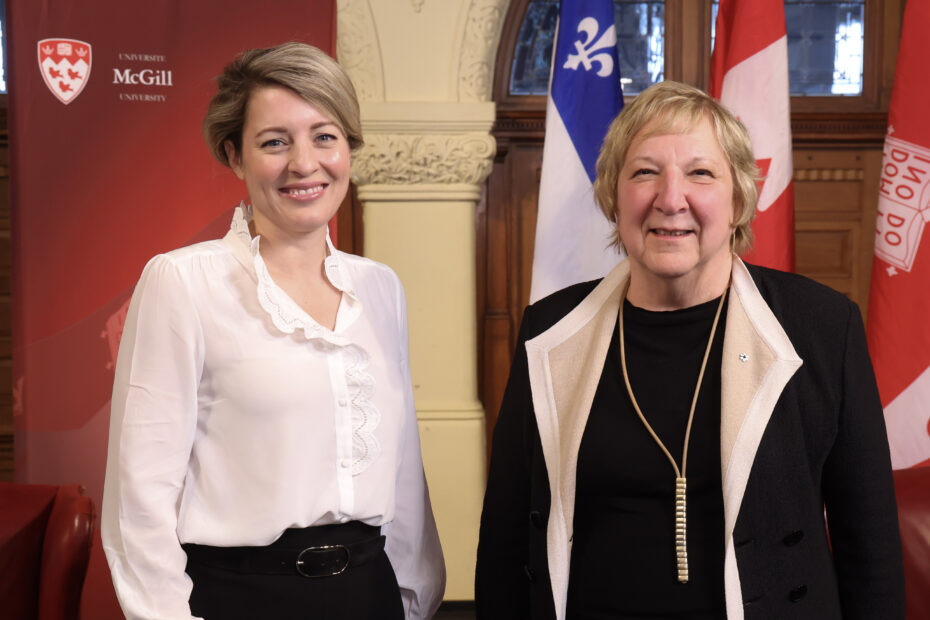Did Mlanie Joly Have A Daughter? Facts & Insights Revealed - Discover!
Does Mlanie Joly have a daughter? The question, often whispered in the corridors of power and dissected in political circles, probes not only the personal life of Canada's Minister of Foreign Affairs but also the evolving expectations placed upon women in high-profile leadership positions.
The realm of public service, particularly at the ministerial level, demands an unrelenting commitment to the nation. Travel, late nights, and the constant scrutiny of the media are simply part of the job description. This demanding lifestyle begs the question: How do individuals, particularly women, balance the relentless demands of their careers with the equally significant responsibilities of family? The publics interest in the personal lives of politicians is a double-edged sword. It can humanize leaders, fostering connection and empathy, but it can also create distractions, fueling gossip and potentially undermining the serious work at hand. In the specific case of Mlanie Joly, the lack of readily available public information regarding a daughter has fueled speculation. The absence of this information, in itself, speaks volumes about the level of privacy a public figure has to maintain, and how it impacts their personal life. It's worth noting that the silence surrounding this particular aspect of her life is often a strategic choice, reflecting a desire to protect family members from the glare of the public spotlight, a position that is understandable given the increasing intensity of public scrutiny. This also suggests the importance of respecting the privacy of individuals, especially those who are not directly involved in the political arena.
| Attribute | Details |
|---|---|
| Full Name | Mlanie Joly |
| Date of Birth | January 16, 1979 |
| Place of Birth | Montreal, Quebec, Canada |
| Education |
|
| Political Party | Liberal Party of Canada |
| Current Position | Minister of Foreign Affairs (since 2021) |
| Previous Positions |
|
| Spouse | Married to: Mr. Flix Marzell |
| Personal Life | Information on whether she has children has not been officially disclosed. |
| Professional Achievements | Spearheaded Canada's foreign policy initiatives on global issues, managed complex international relations, led diplomatic missions and negotiations. |
| Notable Contributions | Active in promoting human rights, supporting democratic values, and advocating for international cooperation. |
| Reference | Prime Minister of Canada's Official Website |
The discourse surrounding a public figure's family life, or lack thereof, reveals a complex interplay of societal expectations, legal considerations, and personal choices. Public figures often face intense pressure to conform to certain narratives. The portrayal of a successful politician frequently includes the perception of a well-rounded personal life. For women in politics, the balancing act becomes even more challenging. They often have to navigate the competing demands of their careers, their families, and societal expectations that can be both traditional and, at times, contradictory. The rise of social media and the 24/7 news cycle have amplified this scrutiny. Every aspect of a public figures life their relationships, their homes, their children, and their hobbies is subject to commentary, often immediate and unedited. The blurring of the line between public and private life creates a unique set of challenges.
This intense level of public interest can have serious consequences. It can impact a politicians ability to govern effectively, divert attention from substantive policy discussions, and in extreme cases, lead to harassment and threats. The media has a crucial role to play in this dynamic. While the public has a right to be informed, the media must also exercise caution and responsibility in its reporting, avoiding sensationalism and respecting the privacy of individuals, especially those who are not directly involved in the political arena. This is important not only for the well-being of the individuals concerned but also for maintaining a healthy democracy. A vibrant democracy requires the participation of diverse individuals, each bringing their own skills, experiences, and perspectives. Creating an environment where public figures feel comfortable being themselves, including having a private life, is essential to encourage this diversity.
The case of Mlanie Joly, and any public official, underscores the significance of examining the personal information landscape, especially when it is not explicitly made available. The withholding of information about one's family can be a deliberate strategy, protecting family members from potential harm, as the lives of the public figure and their relatives will be subject to more intense scrutiny. It also highlights a respect for privacy and the importance of allowing individuals to make their own decisions about the degree of transparency in their personal lives. Any individuals right to privacy is a fundamental value. Public scrutiny should not come at the cost of individual well-being or the ability to maintain a healthy personal life.
However, the absence of readily available information about a public figures family is not a vacuum; it will invariably be filled by speculation and rumors. This can, unfortunately, lead to the spread of misinformation and potentially damage the reputation of both the individual and their family. The public can respond to the information vacuum by being more critical. By questioning the sources of information and examining the motivations of those who spread rumors, the public can help to mitigate the negative effects of misinformation. In the digital age, the swift spread of misinformation is a major concern. Educating the public about media literacy and encouraging critical thinking is paramount. The challenge is not just about identifying false information but understanding the complex systems that allow for its spread, like algorithmic amplification.
The role of the media in this dynamic is also important. Responsible journalism is essential to protect individuals from unwarranted intrusion into their private lives. The media has a responsibility to verify facts, avoid sensationalism, and respect the privacy of individuals, including those who are not directly involved in the political arena. Moreover, the media's coverage must be balanced and fair, providing context and nuance to its reporting. In the context of political reporting, this means holding public figures accountable for their actions while respecting their privacy and the privacy of their families. The focus of reporting should be on the actions and decisions of the politician and their impact on the public, while minimizing the intrusion into their personal lives.
The topic of privacy is not merely a personal matter; it is also deeply interwoven with larger issues of social justice. The protection of privacy is essential to protect those who are more vulnerable to discrimination, harassment, and abuse. This is particularly true in the case of marginalized communities and other vulnerable individuals. Public figures can significantly advance the cause of social justice by supporting policies that protect privacy. They can also use their platforms to raise awareness of the importance of privacy and speak out against abuses of power. Conversely, a lack of privacy can be used as a weapon against these same individuals. The publication of private information can be used to intimidate, threaten, or harass them. This makes the protection of privacy all the more important, particularly in this current climate.
The legal framework surrounding privacy is also important. Laws governing privacy must be up-to-date and robust enough to address the challenges posed by modern technology. This includes protecting individuals from surveillance, data breaches, and the misuse of personal information. As new technologies emerge, the legal framework surrounding privacy must evolve to keep up with the ever-changing technological landscape. This may require new laws, regulations, and policies to protect individuals from the potential harms of technology. The interplay between personal privacy and public information is complex. The balance between the right to know and the right to privacy is a fundamental aspect of any healthy democracy. This balance must be carefully considered to ensure that the rights of all individuals are protected.
The narrative of public service and family life has evolved significantly over the past few decades. Historically, politicians, especially men, were often expected to have the support of a stay-at-home spouse, who managed the household and cared for children. However, as more women entered the political arena, this model began to change. Today, many politicians juggle the demands of their careers with the responsibilities of family, often with the assistance of partners, family members, or childcare providers. This shift reflects broader societal changes in gender roles and expectations. The recognition of the importance of work-life balance, including the need for both parents to be actively involved in raising children, is becoming increasingly prevalent. It's becoming increasingly common for both partners to be equally committed to their professional lives and family responsibilities. However, the challenge of balancing these competing demands remains significant, particularly for women who continue to face gender-based biases and stereotypes.
The modern political landscape also faces the influence of political dynasties and family legacies. Political dynasties are quite a complex phenomenon. The offspring or relatives of former politicians often have access to privileged information and resources. Political dynasties present unique challenges for democracy. On the one hand, they can provide stability and continuity. Family members often bring unique expertise and experience to the table, and the stability of the family can provide a sense of permanence in a constantly shifting political environment. The families of the politicians may also have access to well-established networks and financial resources, which can be advantageous. On the other hand, political dynasties can also be seen as a source of elitism and privilege. Those from established political families may be perceived as being out of touch with the concerns of ordinary citizens. Furthermore, it can be difficult for non-dynastic candidates to compete with the resources and advantages of political dynasties. The prevalence of family legacies and dynastic politics warrants continued scrutiny. This is important for ensuring fairness, transparency, and equal opportunity in the political process.
The medias role in shaping public perception has become ever more important, with the evolution of the internet, social media, and the rise of citizen journalism. Traditional media outlets still play a crucial role in the dissemination of news and information, but they face new challenges in the face of the vast amount of information, misinformation, and disinformation circulating online. The rise of social media has changed how people consume news and how they interact with public figures. Politicians can use social media to bypass the traditional media and communicate directly with their constituents. But social media can also be a breeding ground for misinformation and abuse. The responsibility of public figures to use social media in a responsible manner is significant. The role of digital platforms in shaping public opinion is a continuing conversation.
The question of whether or not Mlanie Joly has a daughter is ultimately a question of privacy and personal choice. Regardless of the answer, the public's response to this question says something about our own beliefs about women in leadership, the role of family in public life, and the boundaries between personal and professional spheres. The discussion surrounding her personal life allows for a much broader examination of the societal context within which public figures operate. To continue to examine the questions about privacy and transparency in the current political climate is vital. The debate continues and, undoubtedly, the discussion will persist, as will the ongoing tension between the public's right to know and an individual's right to privacy. This ongoing dialogue shapes not just our understanding of individual politicians, but also our collective understanding of the values and expectations that we place on those who lead us.

Does Melanie Joly Have Kids? Exploring Her Personal Life And Career

Does Melanie Joly Have Kids? Exploring Her Personal Life And Career

Does Mélanie Joly Have A Daughter? Exploring The Life Of A Prominent